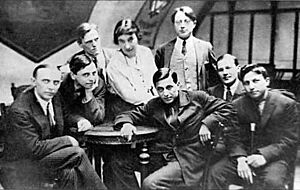Veniamin Kaverin facts for kids
Quick facts for kids
Veniamin Kaverin
|
|
|---|---|
|
Kaverin on the far right
|
|
| Born | Veniamin Abelevich Zilber April 19, 1902 Pskov, Russian Empire |
| Died | May 2, 1989 (aged 87) Moscow, Soviet Union |
| Resting place | Vagankovo Cemetery |
| Occupation | Writer, dramatist, screenwriter |
Veniamin Kaverin (born Veniamin Abelevich Zilber, April 19, 1902 – May 2, 1989) was a well-known Soviet and Russian writer. He wrote many interesting stories, plays for the stage, and scripts for movies. He was also connected to a group of writers in the early 1920s called the Serapion Brothers.
Contents
About Veniamin Kaverin
Veniamin Kaverin was born in Pskov, Russia. His father, Abel Abramovich Zilber, was a bandleader for an army regiment. His mother, Khana Girshevna Desson, owned music stores.
Veniamin had an older sister, Leah, who married a famous writer named Yury Tynyanov. Yury was a classmate of Veniamin's older brother, Lev Zilber.
His Education and Family
Kaverin went to school in Pskov. Later, he studied at the Leningrad Institute of Living Oriental Languages, where he learned Arabic. He also studied history and language at Leningrad State University.
During this time, he became friends with a group of language experts. He also married Yury Tynyanov's younger sister, Lidia. They had two children, Natalia and Nikolay.
His Most Famous Book
During World War II, Kaverin wrote his most famous novel, The Two Captains. This book was written between 1938 and 1944. It tells exciting stories about Russian explorers who traveled to the North Pole.
The book was very popular and won a special award called the Stalin Prize in 1946. It was printed many times and even made into movies twice, in 1955 and 1976.
Standing Up for What's Right
Later in his life, Kaverin wrote about his memories of being a writer in the 1920s. He was brave enough to write things that were critical of how the government handled literature.
A newspaper called The Moscow News once said that Kaverin showed how people could stay kind and honest, even when times were very difficult. He was a good example for many other writers.
Veniamin Kaverin is buried in the Vagankovo Cemetery in Moscow.
See also
- Lev Zilber
- Microbiology
 | Madam C. J. Walker |
 | Janet Emerson Bashen |
 | Annie Turnbo Malone |
 | Maggie L. Walker |


